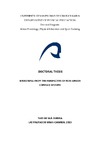Identificador persistente para citar o vincular este elemento:
https://accedacris.ulpgc.es/jspui/handle/10553/11245
| Campo DC | Valor | idioma |
|---|---|---|
| dc.contributor.advisor | Navarro Valdivielso, Manuel Evaristo | - |
| dc.contributor.advisor | García Manso, Juan Manuel | - |
| dc.contributor.advisor | Martín González, Juan Manuel | - |
| dc.contributor.author | De Saa Guerra, Yves | - |
| dc.contributor.other | Departamento de Educación Física | en_US |
| dc.date.accessioned | 2014-01-22T03:30:29Z | |
| dc.date.accessioned | 2018-06-05T11:38:19Z | - |
| dc.date.available | 2014-01-22T03:30:29Z | |
| dc.date.available | 2018-06-05T11:38:19Z | - |
| dc.date.issued | 2013 | en_US |
| dc.identifier.uri | https://accedacris.ulpgc.es/handle/10553/11245 | |
| dc.description | Doctoral program: Motor praxiology, physical education and sport training | en_US |
| dc.description.abstract | We consider basketball as a complex systemic unit. There is areciprocal relationship between the basketball team and its environment. Therefore it is importantto figure out thebehaviorof the participating agents, as well as their relationships. First at all we carried out an approach to the degree of competitiveness of a sport league as complex phenomenon. In thefirst study, we used the results of previous seasons as a way to investigate the victoryprobabilities of each team. We developed a model based on Shannon entropy using two extreme competitive structures, a hierarchical structure and a random structure and applied this model to investigate competitiveness of the NBA (USA) and the ACB (Spain). Both leagues entropy levels are high (NBA mean 0.983; ACB mean 0.980) indicating high competitiveness although entropy of the ACB (from 0.986 to 0.972) demonstrated more seasonal variability than the NBA (from 0.985 to 0.990). Thismethodology has been useful for investigating sports competitiveness. | en_US |
| dc.format | application/pdf | es |
| dc.language | eng | en_US |
| dc.rights | by-nc-nd | es |
| dc.subject | 241106 Fisiología del ejercicio | en_US |
| dc.subject.other | Baloncesto | es |
| dc.subject.other | NBA | es |
| dc.subject.other | ACB | es |
| dc.subject.other | Actividad física | es |
| dc.title | Basketball from perspective of nonlinear complex systems | en_US |
| dc.type | info:eu-repo/semantics/doctoralThesis | en_US |
| dc.type | Thesis | en_US |
| dc.compliance.driver | 1 | es |
| dc.contributor.departamento | Departamento de Educación Física | en_US |
| dc.contributor.facultad | Facultad de Ciencias de la Actividad Física y el Deporte | en_US |
| dc.identifier.absysnet | 693898 | es |
| dc.investigacion | Ciencias de la Salud | en_US |
| dc.rights.accessrights | info:eu-repo/semantics/openAccess | es |
| dc.type2 | Tesis doctoral | en_US |
| dc.description.notas | Contiene resumen en español | en_US |
| dc.utils.revision | Sí | en_US |
| dc.identifier.matricula | TESIS-1074513 | es |
| dc.identifier.ulpgc | Sí | es |
| dc.contributor.programa | Praxiología Motriz, Educación Física Y Entrenamiento Deportivo | es |
| item.fulltext | Con texto completo | - |
| item.grantfulltext | open | - |
| crisitem.author.dept | GIR Praxiología motriz, entrenamiento deportivo, didáctica de las actividades físicas y salud | - |
| crisitem.author.dept | Departamento de Educación Física | - |
| crisitem.author.orcid | 0000-0001-7780-3360 | - |
| crisitem.author.parentorg | Departamento de Educación Física | - |
| crisitem.author.fullName | De Saa Guerra, Yves | - |
| crisitem.advisor.dept | GIR Praxiología motriz, entrenamiento deportivo, didáctica de las actividades físicas y salud | - |
| Colección: | Tesis doctoral | |
Visitas 5
481
actualizado el 15-ene-2026
Descargas
991
actualizado el 15-ene-2026
Google ScholarTM
Verifica
Comparte
Exporta metadatos
Los elementos en ULPGC accedaCRIS están protegidos por derechos de autor con todos los derechos reservados, a menos que se indique lo contrario.
